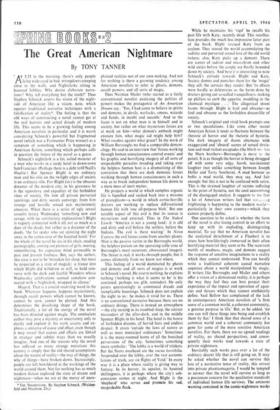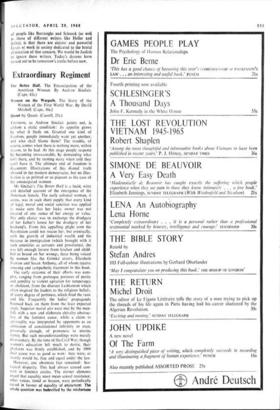inc V qcg,ONEI°02
The Great American Nightmare
By TONY TANNER
AT 3.33 in the morning, there's only people lying wide-eyed in bed, wrongdoers creeping close to the walls, and Nightclerks sitting in haunted lobbies. Why devise elaborate narra- tions? Why tell everything but the truth?' Thus Stephen Schneck asserts his vision of the night- side of American life; a vision, note, which equates traditional narrative techniques with a falsification of reality*. The feeling is that the old ways of constructing a novel cannot get at the real horrors and actual dreads of modern life. This seems to be a growing feeling among American novelists in particular and it is worth considering Schneck's powerful but fragmented novel (which was a Formentor Prize winner) as a symptom of something which is happening in American fiction, something which perhaps calls in question the future of the novel as a genre.
Schneck's nightclerk is a fat, soiled monster of a man who works in a seedy hotel in down-town San Francisco. (Perhaps there is a debt to O'Neill's Hughie.) But Spencer Blight is no ordinary man and his role on the twilight edges of society is no ordinary role. For Blight (sic) is the obscene dreamer of the modern city; in his grossness he is the repository and expediter of the forbidden vices of society. On him all private perverted yeatnings and dirty secrets converge; from him strange and horrific sexual acts mysteriously emanate. When there is a series of ugly sexual assaults (every Wednesday 'something new and savage, with no satisfactory explanations') Blight is vaguely connected with it all, not so much as a doer of the deeds, but rather as a dreamer of the deeds, 'the fat spider who sat spinning the night away in the rotten core of the haunted hotel.' For the whole of the novel he sits in his chair, reading pornography, cutting out pictures of girls, musing, remembering, his capacious mind permeable to past and present foulness. But, says the author, this state is not to be 'mistaken for sleep, but must be respected as a state of magick : a trance into which Blight did withdraw at will, to hold con- verse with the dark and fearful Wonders whose Wednesday celebrations seemed somehow con- nected with a Nightclerk, wrapped in silence.'
Magick. That is a crucial recurring word in the book. Whatever happens, happens mysteriously, through occult powers which cannot be known, cannot be seen, cannot be plotted. And this determines the dissolving shape of the book. Traditionally, a lot of the energy of the novel has been directed against magic. The omniscient author may pose a mystery or uncertainty only to clarify and explain it; his work asserts and ex- plores a universe of cause and effect, even though it may reveal that causes and effects are linked in stranger and subtler ways than we usually imagine. And one of the reasons why the novel has suffered so many strange mutations this century is simply that the old shared assumptions about the nature of reality—the way of things, the why of things—have broken down. Increasingly, people are left bewildered at the workings of the world around them. Not for nothing has so much modern fiction explored the state of dream and nightmare—when we are at the mercy of unex- * THE NicirrcLEak. By Stephen Schneck. (Weiden- kid and Nicolson, 21s.)
plained realities not of our own making. And not for nothing is there a growing tendency among American novelists to refer to ghosts, demons, occult powers, and all sorts of magic.
Thus Norman Mailer (who started as a fairly conventional novelist analysing the politics of power) makes the protagonist of An American Dream say : 'Yes, I had come to believe in spirits and demons, in devils, warlocks, omens, wizards and fiends, in incubi and succubi.' And so the focus is not on what man is in himself and in society, but rather on what mysterious forces are at work on him—what demon's ambush might ensnare him, what magic aid might help him? What voodoo against what grace? In the work of William Burroughs we find a comparable demon- ology. He said in an interview that 'forces working through human consciousness control events' and his graphic and horrifying imagery of all sorts of unspeakable parasites invading and taking over the helpless human host is a dramatising of this conviction that there are dark demonic forces working through human consciousness in such a way as to break independent human life down to a mere mess of inert matter.
He projects a world in which complex organic life is liquefied and sucked back into a miasma of protoplasm—a world in which comic-horrific doctors are working to replace differentiated human life with 'one all-purpose blob.' But one notable aspect of this evil is that its source is mysterious and external. Thus in The Naked Lunch: 'America is not a young land : it is old and dirty and evil before the settlers, before the Indians. The evil is there waiting.' In Nova Express the evil forces come from another planet. Man is the passive victim in the Burroughs world, the helpless patient on the operating table (one of Burroughs's most recurrent, obsessional images). The threat is real, it works through people, but it comes ultimately from we know not where.
This feeling of a world dominated by ghosts and demons and all sorts of magics is at work in Schneck's novel. He asserts nothing, he explains nothing ('nothing is what it seems to be' is his continual, perhaps too glib, reminder). He only points questioningly to communal dreads and inexplicable hauntings. Schneck does not explain the night to us: he makes it vivid for us. There is no conventional narrative because there are no ordinary doings. There is instead an atmosphere —the city turning in its troubled sleep, the sinister marauders of the after-dark, and in the middle Spencer Blight in his hotel. The hotel is the house of forbidden dreams, of horrid lusts and endless despair. It exists 'outside the laws of nature as well as most municipal ordinances.' Sometimes it is the many-roomed home of all the banished perversions of the city. Sometimes something more symbolic: 'The lobby is a world of trinkets. But the floors overhead are the vacua horribilia. Suspended over the lobby, over the vast accumu- lations of trash, are six flights of Void.' In every way it is a place where reality is giving way to fantasy. In its horror, its squalor, its haunted shiftingness, it is perhaps where the city's sub- conscious comes at night. And Blight is the `shepherd' who serves and protects his sad, unspeakable flock.
While he maintains his 'vigil' he recalls his past life with Katy, recently dead. This recollec- tion provides the much less impressive latter part of the book. Blight rescued Katy from an asylum. They toured the world accumulating the sadistic and perverted sexual lore of the old world (where, also, Katy picks up a demon). There are scenes of sadism and masochism and other wild antics before the couple are finally hounded down by society. And here it is interesting to note Schneck's attitude towards Blight and Katy. Society damns and punishes them for the 'magic' they sell. the services they render. But 'its effects were hardly as deleterious as the harm done by doctors giving out so-called tranquillisers, making up philters to curb the appetite, meddling in the chemical mystique . . The allegorical intent looms through. Blight is foul and obscene—as foul and obscene as the forbidden dream-life of society.
Schneck's original and vivid book prompts one or two speculations. Like some other recent American fiction it tends to fluctuate between the rhetoric of horror and the rhetoric of hysteria. The dark imagery of doom alternates with exaggerated and 'absurd' scenes of sexual devia- tion and mad violent escapades (the blurb inv -kes the Marx brothers—Burroughs is more to the point). It is as though the horror is being shrugged off with some very edgy, harsh, too-insistent laughter (not unlike something between Joseph Heller and Terry Southern). A mad humour as befits a mad world, they may say. And fair enough; but this is not to be confused with satire. This is the strained laughter of victims suffering to the point of hysteria, not the cool anatomising of the disengaged analyst. It suggests to me that a lot of American writers feel that son..:,.):ng frightening is happening to the modern world— particularly in their own country—which they cannot properly define.
One question to be asked is whether the form of the novel is also losing control in an effort to keep up with its exploding, disintegrating material. To say that no American novelist has the analytical detachment of a Flaubert is to stress how bewilderingly immersed in their often horrifying material they seem to be. The recurrent motifs of madness, magic, and demons suggest the response of sensitive imaginations to a reality which they cannot understand. You can hardly write a traditional coherent causal narrative sequence about a world manipulated by magic. If writers like Burroughs and Mailer and others offer a vision of a demonised reality, it is perhaps the way they feel they can best project their experience of the impact and operation of agen- cies and threats which they cannot confidently define. Saul Bellow has complained of the lack in contemporary American novelists of 'a firm sense of a common world, a coherent community, a genuine purpose in life.' But, as he added, `no one can will these things into being and establish them by fiat.' I think that that shared sense of a common world and a coherent community has gone for some of the more sensitive American novelists. For them, there are no agreed readings of reality, no shared perspectives, and conse- quently their works tend towards a state of private nightmare.
Inevitably such works pass over a lot of the ordinary decent life that is still going on. It may be asked whether the novel can survive this loss of a normative Sense of reality, this retreat into private phantasmagoria. I would be tempted to answer that the novel will survive as long as a passionate concern for the qualitative standards of individual human life survives. The ominous warning contained in the comic-nightmare works
of people like Burroughs and Schneck (as wen as those of different writers like Heller and Selby), is that there are sinister and powerful forces at work in society dedicated to the brutal elimination of that concern. We would be foolish to ignore these writers. Today's dreams have turned out to be tomorrow's truths before now.











































 Previous page
Previous page